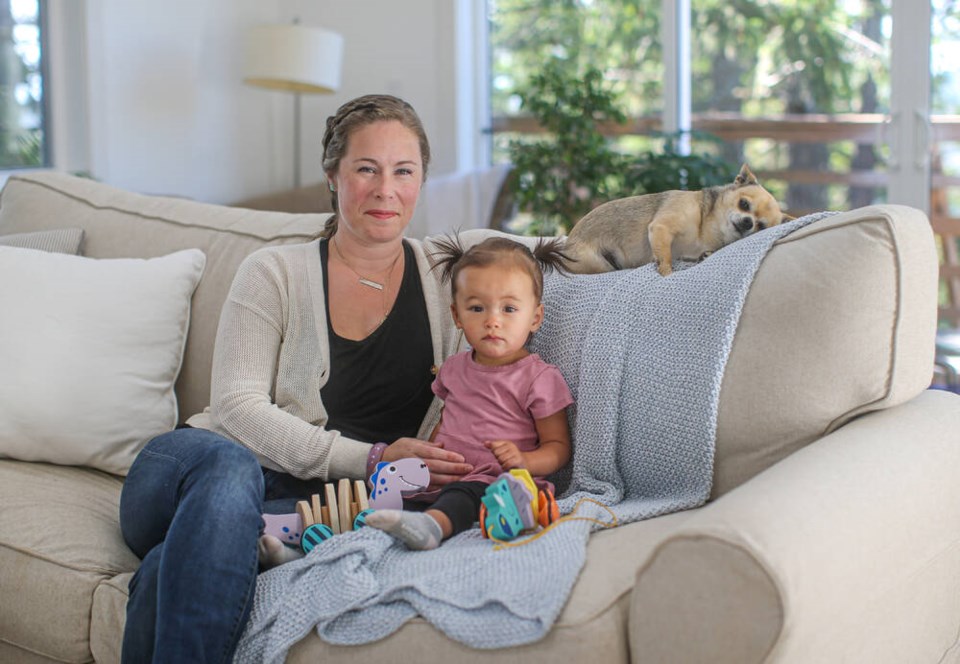When we last heard from Andrea Merrick, in 2019, she was feeling a bit queasy. Not about the impending federal election, but because she had morning sickness, was about to become a mom.
Fast forward two years. Merrick is trying to clean her Langford kitchen while Olive, 1 1/2, scoots around her feet. If you want a new perspective, try having a baby while renovating a house just as the world gets clobbered by a pandemic.
Though, other than that, the 36-year-old hasn’t seen a big change between the last election and this one — except in one disturbing way.
Merrick is our political barometer. She first appeared in this space just before the 2004 federal election, when she was a 19-year-old working at Daly’s Auto Centre in her hometown of Youbou, on Cowichan Lake. As such, she typified the young and the rural, two groups traditionally ignored during campaigns.
We’ve been using her as a reality check ever since, ducking in at election time to see how her concerns match up with those of the candidates. We have followed her to Camosun College, UVic, a job as a registered nurse at the Duncan hospital and, now, a post as a public health nurse. We have seen her go from her family home in Youbou to a Victoria condo, to a place she bought with her partner — a guy she met in nursing school — to that house they’re renovating in Langford.
What’s on her mind this time? Same stuff as before: the environment, transparency in government, politicians who will listen to Indigenous voices (“It means so much to so many people where we live”). If she’s less worried about health care as a campaign issue this time, it’s only because the pandemic has made all the major parties acknowledge how vital the system is to our collective well-being.
Still, as a health professional it’s frustrating to hear candidates who balk at vaccination measures. The consequences of that are real. On the day we speak, someone Merrick knows, an unvaccinated man, is to be put on life support after contracting COVID-19. “It’s happening to people we know,” she says.
Vaccines as a campaign issue are new for 2021. So is the aforementioned disturbing trend: a more strident, divisive, uncompromising tone on the campaign trail. “Everybody is so ‘you’re with us, or you’re against us,’ ” Merrick says.
Parties co-opt issues — climate change, reconciliation, whatever — as their own, as though they’re the only ones who understand or care about them, and dismiss their opponents’ views with contempt. It has always been that way to a certain degree, Merrick says, but this year it’s more pronounced.
Maybe that reflects hyper-partisan U.S. politics drifting north, or maybe it reflects the frayed-nerves snarling of the pandemic, but she doesn’t like it. It dismays her when platitude- and buzzword-spouting politicians try to stake out territory and declare a moral monopoly on issues. “The majority of people care about the majority of things,” Merrick says.
Concerns about the tone of the campaign have been a common theme. In recent weeks I poked around Vancouver Island, stopping people at random to ask what matter to them in this campaign. One of the more frequent, surprising, and less-tangible replies had to do with how Canadians, and those who would lead them, behave as human beings.
“It’s a crying shame we are in many ways cruel to each other,” said octogenarian Frank Bukovac when I buttonholed him outside Courtenay’s London Drugs store. “We have so much in this world to be grateful for, but we treat each other as — pardon me — pieces of s—-.”
Variations of the same worry came from Port McNeill to Nanaimo, to Victoria, to Saturna Island. The intolerance of the self-righteous, not to mention the menacing bellicosity of an emboldened fringe, bothers people.
One of my favourite encounters came in the Cowichan Valley when I stumbled across Ruth Rutledge and Ric Tell about to take their two-person shell onto Quamichan Lake. They’re in sync when it comes to rowing, but not politics. He tilts one way, she another, which makes for some interesting conversations on the water.
“It kind of ruins the row, being hectored from the back seat,” Tell said.
“The bow seat runs the boat,” Rutledge replied.
They disagree in a good-natured, respectful way, which is as it should be. They reflected the Canada in which you would want your child to grow up.



